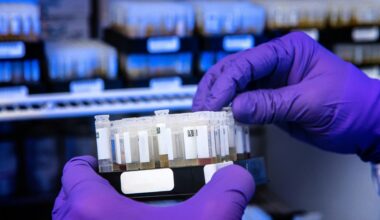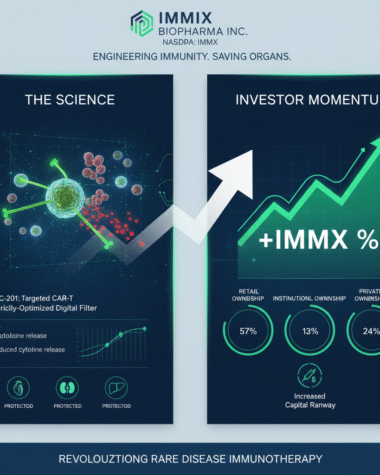CEL-SCI Corporation (NYSE:CVM) is a trailblazing clinical-stage biotechnology company that has spent decades at the forefront of immunotherapy innovation, developing a groundbreaking approach to treating cancer and infectious diseases by harnessing the power of the body’s own immune system. Headquartered in Vienna, Virginia, CEL-SCI is widely recognized for its long-term commitment to revolutionizing oncology treatment through its lead drug candidate, Multikine® (Leukocyte Interleukin, Injection)—a first-in-class, investigational immunotherapeutic designed to be administered before traditional cancer therapies like surgery, radiation, and chemotherapy.
Unlike conventional treatments that often damage the immune system, CEL-SCI’s strategy is based on the compelling hypothesis that stimulating the immune system prior to surgical intervention—when it is still intact—could dramatically improve patient outcomes. This concept challenges the status quo in oncology and offers a new immunological framework aimed at significantly increasing survival rates, especially in patients with limited options.
The company’s flagship therapy, Multikine, has been dosed in over 740 patients and is the subject of the largest and most comprehensive Phase 3 trial ever conducted for head and neck cancer. Designed as a neoadjuvant (pre-surgery) treatment, Multikine works by activating the immune system at the site of the tumor before surgery occurs, enabling a stronger, more localized immune response against cancer cells. This approach has already earned CEL-SCI Orphan Drug designation from the U.S. FDA for the treatment of squamous cell carcinoma of the head and neck—a major milestone that speaks to both the therapy’s potential and the urgency of the medical need it addresses.
With over 30 years of scientific research and development behind it, CEL-SCI is not a biotech newcomer. The company has steadily advanced its pipeline while maintaining full ownership of its intellectual property, manufacturing capabilities, and global rights to Multikine. Beyond oncology, CEL-SCI also owns the LEAPS (Ligand Epitope Antigen Presentation System) platform, a versatile technology aimed at combating autoimmune and infectious diseases through selective immune modulation. This gives the company a diversified portfolio and opens the door to potential partnerships, licensing opportunities, and long-term revenue streams.
In recent years, CEL-SCI has made strategic strides toward regulatory approval and commercialization. Following the completion of its pivotal Phase 3 trial, the company received FDA approval to initiate a confirmatory Registration Study targeting newly diagnosed, treatment-naïve patients with locally advanced head and neck cancer. This next trial stage, focused on a subgroup of patients who derive the most benefit from Multikine, represents a critical step toward potential FDA approval.
Now listed on the NYSE American under the ticker symbol CVM, CEL-SCI is one of the most compelling micro-cap biotech companies positioned to reshape the landscape of immuno-oncology. With an innovative therapeutic approach, a robust clinical track record, and strong momentum fueled by favorable regulatory trends—such as the FDA’s recent approval of Keytruda for PD-L1 positive patients—CEL-SCI is uniquely poised to serve an underserved population of cancer patients and unlock tremendous value for early investors.
FDA’s Approval of Merck’s Keytruda Marks a Turning Point for CEL-SCI’s Multikine
In June 2025, the FDA granted regulatory approval to Merck’s Keytruda (pembrolizumab) for use as a perioperative treatment—before and after surgery—in patients with resectable locally advanced head and neck squamous cell carcinoma (HNSCC) whose tumors express PD-L1. This development not only validates the concept of pre-operative immunotherapy but also shines a spotlight on Multikine’s distinct advantage in treating the majority of patients who do not express PD-L1.
Keytruda’s approval was based on interim data from Merck’s Phase 3 KEYNOTE-689 trial, in which it reduced the risk of recurrence and progression by 30% for PD-L1 positive patients. However, it did not show an overall survival (OS) benefit, and offered no benefit to PD-L1 negative patients, a critical subgroup representing a large segment of the cancer population.
In stark contrast, CEL-SCI’s completed Phase 3 study demonstrated that Multikine, when administered before surgery, reduced the risk of death by 66% in patients with low or zero PD-L1 expression—a group underserved by existing therapies. The five-year overall survival rate was 73% for Multikine-treated patients, compared to 45% in the standard of care group, with a highly statistically significant p-value of 0.0015. This survival advantage represents a nearly four-year median OS gain.
This data positions Multikine not just as a complementary treatment to drugs like Keytruda, but as a potential standard of care for a patient population currently lacking effective immunotherapy options. According to CEL-SCI’s CEO, Geert Kersten, the FDA’s willingness to approve Keytruda based on interim results from a similar trial strongly implies that Multikine could qualify for accelerated regulatory approval, especially with the FDA already having greenlit CEL-SCI’s planned 212-patient confirmatory Registration Study.

CHECK THIS OUT: Johnson & Johnson (JNJ) can be the Next Trillion-Dollar Stock and Boston Scientific (BSX) Just Signed a $45M Deal—Here’s What It Means for Investors.
Multikine’s Confirmatory Study: The Path Toward Commercialization
Backed by the strength of its Phase 3 trial and orphan drug designation, CEL-SCI has received regulatory go-ahead for a pivotal confirmatory Registration Study focused on 212 newly diagnosed, treatment-naïve patients with locally advanced, resectable head and neck cancer. This study is laser-focused on the subgroup that benefited most in the earlier trial—patients with low or zero PD-L1 expression—representing the clearest regulatory and commercial path for Multikine.
The implications are profound. If the confirmatory study replicates earlier results, CEL-SCI could be positioned to file for FDA approval of the first neoadjuvant immunotherapy targeted specifically at PD-L1 negative HNSCC patients. Given that approximately 70% of such patients fall into this category, the market potential is enormous—and CEL-SCI could dominate a critical therapeutic niche.
Strategic Capital Raise Supports Near-Term Execution
In alignment with its clinical momentum, CEL-SCI recently raised $5 million in gross proceeds through a public offering of 2 million shares at $2.50 each. While dilution is a short-term concern, this capital provides essential runway to initiate the Registration Study and maintain operational momentum. The offering also included a 45-day option for underwriters to purchase an additional 190,000 shares, ensuring flexibility for further financing needs.
This move underscores CEL-SCI’s strategy to maintain forward progress toward commercialization while preserving long-term shareholder value. With market cap still hovering around $12 million, the stock remains deeply undervalued relative to its clinical data and future revenue potential.
Technical Analysis and Valuation Outlook Suggest Significant Upside
Despite falling over 90% YTD following a reverse stock split, CEL-SCI is experiencing renewed interest from retail and institutional traders. Technical indicators such as Relative Strength Index (RSI) near oversold levels and MACD crossovers suggest a potential price reversal is forming. In recent trading sessions, volume has spiked dramatically—often a precursor to sustained upward momentum.
Meanwhile, analysts covering CVM remain incredibly bullish, with price targets ranging from $180 to $300 per share, implying an upside potential of 7,000% to over 13,000% from current levels. While speculative, these targets are grounded in the projected commercial value of Multikine if it captures even a modest share of the head and neck cancer market, which exceeds $3 billion globally.
Conclusion: CEL-SCI May Be One Breakthrough Away from Rewriting the Rules of Cancer Immunotherapy
CEL-SCI Corporation stands at the intersection of scientific innovation, regulatory momentum, and market opportunity. With Multikine showing unprecedented survival benefits in PD-L1 negative patients—a population largely left behind by existing treatments—and the FDA now displaying a willingness to approve perioperative immunotherapies based on interim data, the stars may finally be aligning for CEL-SCI.
The upcoming confirmatory Registration Study, combined with favorable precedent set by Merck’s Keytruda approval, gives CEL-SCI a viable and accelerated path to commercialization. For investors with high risk tolerance and a long-term horizon, CVM offers an asymmetric opportunity with massive upside potential.
If CEL-SCI successfully navigates the regulatory pathway, the company could emerge not only as a transformative force in immuno-oncology but also as one of the most explosive micro-cap growth stories in recent biotech history.
READ ALSO: This Tiny Surgical Robot Stock Could Disrupt a $30 Billion Industry: Microbot Medical (MBOT) and Pro-Dex (PDEX) Plunges 39% – Here’s Why Smart Investors Are Buying the Dip.








